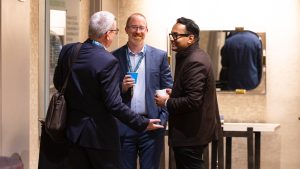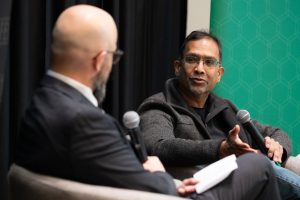In response to debates raging across Canada about whether we have a brain drain – a flood of skilled workers leaving the country – or the reverse, a “brain gain,” Techopia Live assembled a panel of Ottawa experts to share their perspectives and best practices on attracting and retaining tech talent.
Tackling the issue was Shopify’s senior vice-president of engineering Jean-Michel Lemieux, Kanata North Business Association executive director Jamie Petten and director of Hire Immigrants Ottawa Henry Akanko. Joining Techopia Live as co-host was Dean Fulford, vice-president of HR consulting from sponsor Stratford Managers.
Though each panelist had different perspectives, the overall message was clear: Ottawa’s business leaders need to broaden the horizons of their talent searches and focus on the potential of prospective employees rather than their technical skills.
(Sponsored)

A global view: What CarMa Institute is seeing in biotech for 2026
From Adelaide to San Francisco, the biotechnology landscape is shifting – and, in some cases, straining under the weight of market uncertainty. Venture capital funding for biotech has contracted dramatically

Desjardins Elevator Pitch Competition drives entrepreneurial energy at uOttawa
In uOttawa’s Desjardins Elevator Pitch Competition, a single team member stands before the judges, pitching for three minutes, fielding questions for five. There are no decks, notes, props or prototypes
Akanko told Techopia Live that Ottawa is poised to benefit from an influx of people looking for opportunities from around the world, but businesses should first foster company cultures that will welcome newcomers.
“Just having a diverse workforce isn’t enough. It’s about how you manage the diverse workforce. That’s where the magic is,” he said.
Successfully integrating immigrant talent into the team goes beyond the HR department. Chief executives and managers must acknowledge their unconscious biases and find ways to bypass them to retain diverse and valuable talent, Akanko said.
Petten also advocated for new voices in tech. She said she’d like to see more companies going into the mainstream and attracting non-typical talent from fields such as health care, education and hospitality.
“They’re able to offer experiences and knowledge that our tried-and-true tech talent might not have exposure to,” she said.
Widening the talent pipeline has been important for Shopify, Lemieux added. He pointed to the Ottawa-based company’s Dev Degree, a partnership with Carleton University that sees computer science students receive on-the-job educations at Shopify, as a chance to breed industry-ready workers. It’s a model that he’d like to see brought to other universities and tech firms in Canada to address the country’s talent demands.
“This is something we have to unlock if we want to scale it,” he said.
That’s a potential solution for entry-level talent, but Lemieux and Petten both pointed to the need to invest in employees to build up homegrown talent to higher-level positions. For that reason, Lemieux said Shopify often hires not for a person’s immediate skills, but for their potential and what they could do for the company with a bit of support.
“If people grow as quickly as the company, you’ll be successful,” he said.
Of course, outside talent is important to facilitate a so-called “brain gain.” Lemieux said around 30 per cent of Shopify’s hires in Ottawa are attracted from outside of the city.
Some, such as officials at Invest Ottawa, often champion the capital’s lifestyle and cultural offerings to lure new workers. Lemieux agreed with that approach, but he said what really convinces new employees to uproot their lives to come and work for Shopify is selling them on the problem the company is trying to solve – and in doing so giving them a purpose.
If more people and companies did that, he said, more prospective workers might see Ottawa as the best possible place to build their career.
“Let’s go tell the world what we’re doing,” he said.




